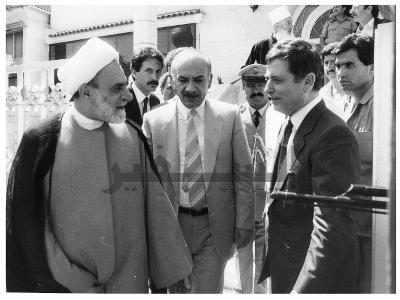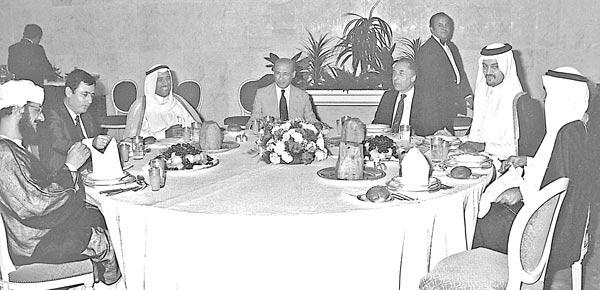Syria accused the United States and Israel today of escalating tension in the Middle East and Israeli Prime Minister Menachem Begin said if diplomatic efforts fail to remove Syriian missiles from Lebanon ‘we will do what we have do.’
‘Israel’s aggressive policy, with American support, has turned the Middle East region into a real powder keg .. Israel is playing with fire near that barrel with American encouragement,’ the Syrian government-run newspaper Tishrin said in an editorial today.
It said that if the United States wanted to ‘avert an explosion in the area,’ it should send emissaries ‘and advice to the Israeli leaders.’
Soviet Deputy Foreign Minister Georgi Korniyenko arrived in the Syrian capital today for talks with Syrian officials, Damascus radio reported. It said Korniyenko will have ‘an exchange of views’ with the Syrian officials.
The editorial coincided with a Washington announcement that Philip Habib, a career diplomat, will visit Lebanon, Syria and Israel this week in an attempt to defuse the Syrian-Israeli missile crisis.
Syrian Foreign Minister, Abdel Halims Khaddam, completed the second round of his talks with Lebanese factions Tuesday and returned to the Bekaa Valley, northeast of Beirut.
State Department spokesman David Passage said Habib would not carry any proposals to the three nations, but would listen to their leaders ‘to explore ways of defusing the situation.’
‘The United States welcomes the restraint shown by all the parties in the present crisis and we hope that restraint will continue,’ Passage said.
Syrian officials said a top aide to Soviet Foreign Minister Andrei Gromyko would arrive in Damascus today for talks with government leaders. In Moscow, U.N. Secretary General Kurt Waldheim said Soviet leaders believe fighting in Lebanon can be stopped only by overall Middle East peace.
‘The suggestion for an international conference was repeated,’ Waldheim said today of talks Tuesday with Soviet President Leonid Brezhnev. ‘The hope was expressed that a comprehensive solution of the Middle East problem would of course also lead to a settlement of the Lebanese crisis.’
But both Israel and Syria seemed unwilling to change their stands on the Syrian deployment of Soviet SAM-6 missiles northeast of Beirut. SAM-3 and SAM-2 surface-to-air missiles were installed last week along the Syrian border near Lebanon.
Syria took the action after Israeli jets downed two Syrian helicopters that were attacking Christian Lebanese forces in the strategic valley near the Lebanese capital. Israel has backed the Christian forces in Lebanon’s internal struggle.
‘There is no issue called the missile issue, there is the issue of Israeli aggression on Lebanon,’ Khaddam said in Beirut, where he concluded another round of talks with local leaders searching for an end to internal Lebanese fighting.
‘It is ridiculous. Israel wants security for its planes to attack the innocent in Lebanon,’ Khaddam said, adding Israel believes Syria does not have the right to fight back. ‘This is stupid logic and non-negotiable.’
Syria did not comment Tuesday on Habib’s planned visit and diplomatic sources in Damascus said U.S. Ambassador Tolcott Seeley had met several Syrian officials but not President Hafez Assad.
‘The situation is still tense,’ a highly placed Western diplomat in the Syrian capital said, ‘and the Syrians seem willing to risk a limited conflict with Israel over the missile issue.’


